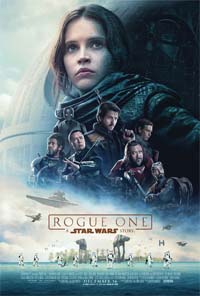
I don't think that Disney's writers take Star Wars' universe very seriously. I'm not talking about story or continuity; I'm talking about the actual, physical space in which the stories take place. They've created a major problem. It's the same problem that frustrated me about The Force Awakens: there is no sense of scale to this universe anymore. I was really hoping that it was just J.J. Abrams and his writing crew being lazy in Force Awakens because his Star Trek movies suffered from the same problem. I had hoped that a new writing crew would improve the material (just like Star Trek Beyond fixed another of my biggest complaints about the reboots of that franchise after J.J. left the helm). But that laziness seems to not only be contagious, but has actually gotten worse in Rogue One. This movie takes something that was only a nagging annoyance in Force Awakens, and blows it up to almost movie-breaking proportions.
In the original Star Wars movies, the time-frames for hyperspace travel was always ambiguous. There were cuts between scenes, and the amount of time that it took for ships to travel was left to the individual viewer's imagination. But now, we see interstellar travel and communications happen instantaneously, in real time! It happens when the fighter crashes on Eado, and the rebel base on Yavin immediately loses contact and sends a squad of fighters to assault the base. It happens again when Rogue One infiltrates the Imperial data warehouse on Scarif, a transmission is intercepted, and a rebel fleet immediately gets rerouted to the planet.
This isn't just bad science; it's also bad writing. The hyperdrive has become a narrative crutch. For the entire second half of the movie, I felt no tension at all because I knew that if the heroes ever got in a jam, a rebel fleet (or reinforcements) could just appear out of nowhere to save the day. This is a prequel, so I already knew how it was going to end. This lazy script contrivance (and all-around dull characters) also made the journey to get there completely uninteresting.
But it goes deeper. How far apart are these places? Is the entire galaxy that accessible?
Basic elements of the overarching Star Wars storyline just completely break down when travel and communication is instantaneous. There's no distinction between the tightly-controlled "core", and the supposedly-lawless "outter rim" planets if a whole fleet of Star Destroyers can literally FTL to any planet in a matter of seconds. There's no need for anyone to make a hard-copy of the Death Star plans to physically transport it if they can transmit the data instantly. And there's no point in pursuing or intercepting ships (such as Leia's Blockade Runner) if hyperspace travel takes the ship to its destination in a mere moment. The empire's holdings become completely indefensible if entire rebel fleets can appear out of nowhere with no warning. Their installations are publicly visible, but the rebels are hidden. The rebels know where all the imperial bases are, and there's nothing stopping them from just jumping to random bases and blowing them up with no recourse from the empire. This universe has lost the believable, lived-in quality and sense of breadth and variety that the original trilogy so expertly executed. The Star Wars universe is broken.
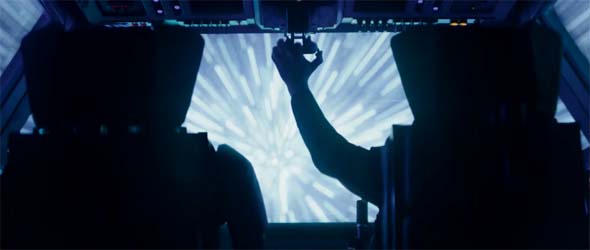
Rogue One shows us instantaneous communication and travel between planets in real time.
"Just turn off your brain and enjoy it", people tell me.
No. I won't turn off my brain. There is no reason why our movies can't be both entertaining and smartly-written. Why aren't we holding our movies to that standard anymore? It's not a tall bar. "Not as bad as the prequels" is not good enough, and I'm not going to pretend that it is when dealing with entries of a series that contains - not one - but two - landmark cinematic masterpieces.
Even if every new movie were as likable as The Force Awakens, these little missteps add up. Each new movie that comes out chips away at the integrity of the franchise (and universe) in which all the movies (including the good ones) exist. We can hand-wave away our complaints about the prequels, or we can ignore them entirely, but we're now at the point at which the original Star Wars trilogy is a minority of the Star Wars film franchise, and it's only getting more diluted. [More]
bed02b8d-cee1-484b-89cb-28dd57548f3e|1|5.0
Tags:Star Wars, Rogue One: A Star Wars Story, Disney, Lucasfilm, prequel, war, espionage, Death Star, Star Destroyer, space, galaxy, faster than light, hyperspace, Grand Moff Tarkin, Darth Vader, uncanny valley, Felicity Jones

I did it again. I waited until the last minute to see a hard science fiction film until it was just about to leave theaters, even though I complain about the conventional Hollywood logic that hard science fiction doesn't sell tickets. In my defense though, I was preparing for a trip out of the country when this movie released. So my excuse this time is far better than my excuse for missing opening weekend of The Martian. And once again, this film's 94% on Rotten Tomatoes (as of the time of this writing) and its exceeding box office projections (coming in third behind a Marvel comic book movie and a children's movie) seems to vindicate that Hollywood can still make high-concept, hard science fiction films, that people will go see them, that people will understand them, and that those people will like them.
Arrival is as hard as hard science fiction gets. Think Contact; think 2001: A Space Odyssey; think the Star Trek TNG episode "Darmok". Arrival is all about communication, and it offers an interesting exploration of how language influences the way that we think, and how our thoughts are filtered through the language that we speak. The entire movie is about the efforts to communicate with the aliens, while human beings progressively become incapable of actually communicating with one another. There's no real villain, exactly one explosion, and the threat of China and Russia starting a war with the aliens on the other side of the globe is a distant, but tangible threat. This film is slow and methodical, much like the efforts to teach a new language to someone, and it makes absolutely sure that the audience will be able to follow along with what is going on.
Moreso than our attempts to communicate with aliens, this film is about our ability (or inability) to communicate with each other - at every level of society. From individual relationships, to professional relationships, to political relationships, to international diplomatic relationships, and even the relationship between the media and the public.
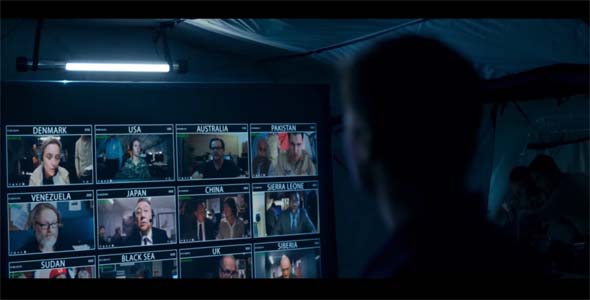
Arrival is more about our inability to communicate with each other, than our inability to communicate with aliens.
It's difficult for me to say anything more about this movie without absolutely, completely spoiling everything. Suffice to say, the high-concept science fiction stuff is very well handled. This movie earns some comparisons to Interstellar, but is far more intelligent and manages to not be hokey at all. Read on if you want spoilers... [More]
023940cc-6fc7-4a26-a273-727d7283c24d|0|.0
Tags:Arrival, Amy Adams, Jeremy Renner, science fiction, grief, extraterrestrial, language, communication, relationships, Slaughterhouse-Five, Kurt Vonnegut, time travel, box office, Hollywood
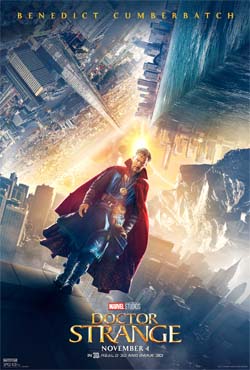
When I reviewed Captain America: Civil War, I said that "the Marvel cinematic universe may be starting to collapse under its own weight". I probably should have said that "it's starting to buckle under its own weight", since Marvel is still a ways off from anything that resembles collapse. That movie also got better upon repeat viewings, but I feel much the same about the recently-released Doctor Strange. In much the same way that I had suspected that Suicide Squad must have taken place years (or decades) prior to Dawn of Justice, I had also assumed that Doctor Strange must have occurred (at least partly) prior to the events of the first Avengers movie.
The story of Doctor Strange is, after all, essentially a Doubting Thomas story. That would be fine if Doctor Strange were a stand-alone movie, but a Doubting Thomas story is a really difficult thing to buy into within the Marvel cinematic universe. By the beginning of the movie, Stephen Strange (who lives in New York) must surely be aware of (and possibly have first-hand experience with) superhumans since the events of the first Avengers movie. In a world in which the literal Norse God of Thunder Thor has descended from the mystical plane of Asgard, to team up with a gamma-powered Hulk and a super soldier frozen since World War II, to defend New York from an inter-dimensional alien invasion, can you really be all that skeptical of astral projection, alternate dimensions, or even blatant magic?
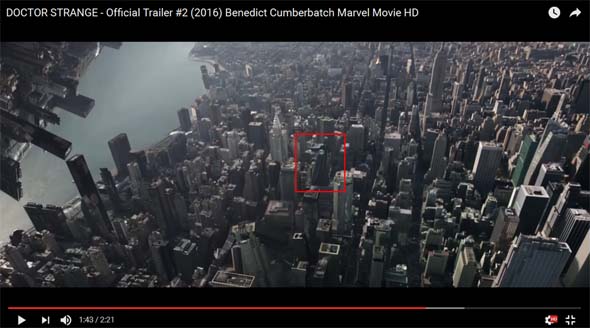
Avengers Tower is clearly visible.
If Doctor Strange's car accident and physical therapy took place long before the events of the first Avengers, then this skepticism would be excusable. If Strange spent years at Kamar Taj learning magic, while oblivious to the events of the Avengers movies, Winter Soldier, and Civil War, then that would be a satisfactory explanation for his ignorance. But I don't think that's the case. Doctor Strange was tight-lipped when it came to references to the other Marvel movies (potentially for this very reason), but Avengers Tower still shows up in the skyline, and I'm pretty sure there were references to the other super heroes in the first half of the movie. In fact, I'm pretty sure that Strange gets a phone call asking if he'd be willing to treat an Air Force colonel who broke his spine in experimental armor. This must surely be a reference to Rhodes' accident in Civil War.
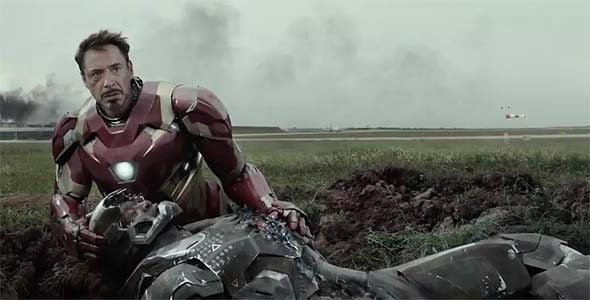
Strange is asked if he'd be willing to treat Colonel Rhodes after injuries sustained in Civil War.
Maybe I'm being nitpicky, but buy-in is important in fantastical movies like this. But it's hard to buy into Stephen Strange, and it certainly doesn't help that he's an abrasive ass hole and isn't very likeable at the start of the movie... [More]
7b5a775b-343d-4ac0-af0a-45a9d6cbff14|0|.0
Tags:Doctor Strange, Marvel, Marvel Comics, Mordo, Kaecilius, the Ancient One, Dormammu, magic, Kamar Taj, astral projection, mysticism, skepticism, Doubting Thomas, Benedict Cumberbatch, Mads Mikkelsen, Avengers
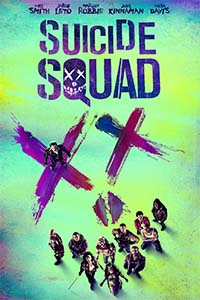
Suicide Squad
I wasn't sure what to think when I walked out of Suicide Squad this past weekend. I desperately wanted this to be the movie in which DC finally gets its ducks in a row and makes a fully competent movie (instead of just half a competent movie). I wanted to find things to like about the movie. I wanted to see some brilliant artistic vision that was realized in the film. But I just couldn't. The whole movie was just off-putting.
I feel like the original creative vision revolved around showing a sense of nobility and honor among villains, while also highlighting that supposed "good guys" can actually be very evil. You know, real Watchmen-level kind of stuff. This would have mirrored some of the more enjoyable elements in the first half of Dawn of Justice (in which Superman and Batman's actions are viewed from different perspectives) and would have offered a pretty solid artistic message. This possible original intent is most apparent with Deadshot and Amanda Waller (Viola Davis), whose behavior is inverse of their perception within society. Deadshot is a vigilante and murderer who is locked up in prison, but he is the most noble and compassionate character in the film. Waller, on the other hand, is a national security adviser responsible for protecting the lives of hundreds of millions of people, but she is a merciless, cynical bitch who will shoot her entire staff in the heads because they apparently didn't have clearance to participate in ... the operation that she enlisted them into?
It's all so ham-fisted. Despite being the most likable, relatable, and heroic character in the movie, Deadshot's sense of honor just gets obnoxious. Waller, on the other hand, is obnoxiously vile. The result is that neither character really works for me, and that underlying theme about "who are the real bad guys?" just kind of gets lost in the meaninglessness of the individual characters' actions.
Deadshot and Amanda Waller seem to be ham-fisted attempts at subverting the "bad guys" and "good guys" tropes.
The fact that none of the other characters besides Harley and El Diablo (who ended up being my favorite character in the film) get any development at all certainly doesn't help. A two-hour runtime is pretty standard for a movie, but I simultaneously feel as though half the movie is cut out, and that half of what is present drags on... [More]
2e8ba24d-94e5-4bc7-b27b-ac1bf895baad|2|5.0
Tags:Suicide Squad, DC Comics, comic book, Warner Brothers, Harley Quinn, Deadshot, Killer Croc, Captain Boomerang, El Diablo, Katana, Enchantress, Amanda Waller, Batman, Joker, Stockholm Syndrome, Superman, Batman Versus Superman: Dawn of Justice, Margot Robbie, Jared Leto, Will Smith, Viola Davis, Ben Affleck, Deadpool
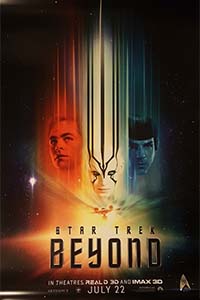
Star Trek: Beyond
I didn't really know what to expect from this movie. I was pleased that Abrams wasn't directing anymore, and that Roberto Orci and Alex Kurtzman weren't writing it. Simon Pegg writing seemed like good news. Justin Lin of Fast and Furious fame directing seemed questionable. The casting of a villain was also disappointing, as it seemed to set the stage for yet another dumb action movie. I watched the trailers, but I tried to avoid larger spoilers and speculation. I didn't want to go into the movie with a bias the way I did with Into Darknes because of all the speculation about Benedict Cumberbatch's character (would he be Khan? Would he not be Khan?).
I was really hoping for Simon Pegg to write a more pure science fiction story instead of a schlocky action movie, especially after the success and hype surrounding The Martian. "Beyond" sounds like a good title for a Star Trek movie. Maybe it would feature the crew of the Enterprise dealing with some kind of environmental challenge out in the unexplored frontiers of space? Maybe it would actually be about exploration and discovery? Maybe it would tell some timeless allegory for the human condition? I could only hope. The announcement of a villain sort of shattered that hope.
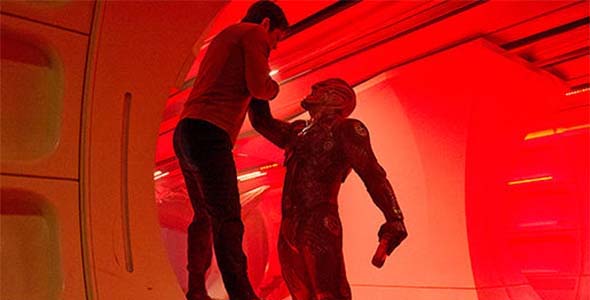
Yet another vengeful supervillain looking for a McGuffin doomsday weapon.
It doesn't help that the villain is really under-written, and that the plot revolves around the bad guy trying to get a McGuffin in order to activate a doomsday weapon. We've only sat through this plot a hundred times in sci-fi and comic book movies over the past decade. If his plan was to attack the space station anyway, then I don't know why he didn't just do it right from the start, while the Enterprise (and the McGuffin) were docked. Come to think of it, why is the Federation building massive, civilian space stations within eyesight of an ominous, unexplored nebula? Meh, I guess that's better than needing the Enterprise to warp back and forth between Earth and the Klingon homeworld in the span of a couple hours... [More]
80e21af4-18df-4984-a5d5-91fbbe299730|1|4.0
Tags:Star Trek, Star Trek: Beyond, Star Trek XIII, Justin Lin, Chris Pine, James Kirk, Karl Urban, Leonard "Bones" McCoy, Zachary Quinto, Spock, Leonard Nimoy, Idris Elba, Krall, Simon Pegg, Montgomery Scott, Enterprise, Yorktown, Franklin, starbase, McGuffin, J.J. Abrams, Alex Kurtzman, Roberto Orci, Star Trek II: the Wrath of Khan, Star Trek III: the Search for Spock, science fiction
|

| 12 | | | | | | | 60 | | 11 | | | | | | | 55 | | 10 | | | | | | | 50 | | 09 | | | | | | | 45 | | 08 | | | | | | | 40 | | 07 | | | | | | | 35 | | 06 | | | | | | | 30 | | 05 | | | | | | | 25 | | 04 | | | | | | | 20 | | 03 | | | | | | | 15 | | 02 | | | | | | | 10 | | 01 | | | | | | | 05 |
|